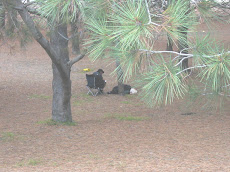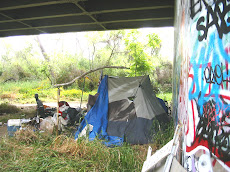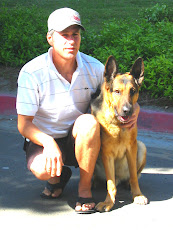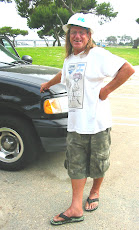I cannot say this is going to be definitive. The whole truth is far too damning, and there is still a lot of blame and hurt and grief over losses. How I became homeless, exactly, has been too much for me to bear, so much of the story is probably best saved for the social workers and therapists.
However, I can tell you the driving forces behind the evils of poverty and homelessness --- faith, hope, and love. Yes, indeed, these were the very ingredients it took to end up in my situation. While you are picking up your jaw, let me say that by far the worst of these three is hope. One cannot have any at all without running enormous risks with one's very life.
Do not hope. You may wish it, but do not hope for anything. There is just no way to know what is going to happen in life without doing yourself the added damage of trying to make it happen, whatever it may be that you have idly constructed as the perfect life. No, you probably do not want it to happen. What will happen is bad enough. That it is a proverbial sleeping dog around which one should tiptoe.
Hope leads to despair of the pure and utter variety. Spare yourself of it. Whenever you find yourself hopeful, look around: it is probably just a sunny day and the temperature is just right. Leave it alone. Do not impart to this natural phenomenon any meaning of hope for your life. And the hope you are feeling is, upon examination, just a feeling based upon . . . nothing at all. There is no reason for it. You do not have what you want and are truly never closer to anything you want until you actually have it. Any feeling or impulse to which you might ascribe the word hope means only that you do not have that it you seek.
Let's review. You are no closer to getting what you want by hoping for it or feeling hope about it. Any feeling or impulse to which you might ascribe the word hope means only that you do not have that it you seek. Only the actual possession of that thing is real. Hope represents a state of unreality, and one should positively avoid it.
Faith is an even more nebulous state than hope. Try not to find yourself there, despite any early-childhood Christian education. Though I myself have always loved Hebrews 11:1, "Now faith is the substance of things hoped for, the evidence of things not seen," I have been tested and I live to tell you that if you cannot see it, then the chances of a reality with it are pretty slim. Like I said, it may just be the sunlight's effect on cold skin. You may also have a penchant, like I do, for obscure, confounding, convoluted thinking expressed in a simple elegant way.
And, finally, the greatest destroyer of that I Corinthians big three is Love. I am not disputing that one may be wrongheaded about love in the first place, and Love may be the big it you want and need, as it was for me a few years ago. I was not delusional: rather, I had hope and faith; then love followed. Love is what propels one to make the leap, to do the deed, to take the actions. Love is the binder if faith and hope have set your mind dancing.
Looking back at all the New Age spiritual claptrap I imbibed before leaping with everything I owned into a pact with a man I barely knew, it will not surprise you at all that I now firmly believe in arranged marriages. More than that, one should just move to one of those countries where marriages are arranged; and if you should still believe in reincarnation, then get yourself born there.
The thing with men and women boils down to the simple-minded, and it has very little meaning by the time one hits age 50 in any case. The male/female relationship hardly warrants the fuss of a wedding at age 20 or any other. Truly, to dignify yin and yang in any meaningful way, it has to be arranged from childbirth, or well before. It must be the union of two families all the way back to the beginning of time, and it must have the earthly consequence of producing genetically-sound children, peace in the home and community, and adding to the material comfort of each family. Other than that, what is the use?
It just so happens I was a single woman at or nearing 50 when it occurred to me that I could be happier and more complete somehow after an entire lifetime unmarried if I only had the right yang. I searched for a few years with increasing disappointment such that by the time I met what I thought was the right yang for the rest of my life, I was too addlepated to make any decision of the force and consequence this would have. The bases of my choice of that particular yang are now almost imperceivably shrouded by the magnitude of stupidity it took to end up where I am now. I must have had reasons, but the more I think about it, the more I think menopause is a dangerous hormonal state.
And then there were the other factors of having never married, being childless, being somewhat lost due to not having married and being childless, not being a career type despite a solid education, and so on. Furthermore, being married, having children, and keeping house were the unfulfilled dreams that became fodder for the spiritual gristmills of hope, faith, and love. Now let's throw my mother into the mix.
My mother's one great burden, her cross surely to the end of her life, is that she never forgave her father. She still has not forgiven him, and that has perhaps been the most salient feature of my relationship to my mother as I will explain. I believe my grandfather loved my grandmother. I prefer to start from that premise as there is no evidence to the contrary.
This much is known: my grandmother died of hemorrhaging, presumedly from an attempted back-alley abortion. My Aunt Donna, the eldest of my mother's siblings, recalls removing bloody sheets from her mother's bed. There is no mention of an attending doctor, just my grandmother taken to bed and bleeding. It has been expressly verboten to tell this story. My Great Aunt Alice, my maternal grandfather's sister, would never permit discussion of it and would, if not deny the story, actively suppress it with a stern, rhetorical, "Who told you that!"
My grandmother, Maxine, left five young children. My mother was in the middle and was age 9 at her mother's death. These children were subsequently shuttled back and forth, between and among, grandparents and aunts and uncles in no particular way of doing it, though considerable guilt and shame surrounding my grandmother's untimely death had to contribute to efforts to keep the little five out of the orphanage.
Knowing something about men at my late age, I imagine my grandfather ran. He ran in every way a man can run and as far as he could without utterly denying he had children and family. I believe he did the best he could even as he carried the burden of complicity in an act that killed his wife.
For one thing, my grandfather stayed in the Navy, not that there is much information from anyone about what this man did after my grandmother's death. The mortification over the way Maxine died had to have crippled any relationship with the remaining relatives who were reared, mind you, by Victorians. It is said that my maternal great-grandparents never spoke of their son-in-law because they were good Christians, so the reasoning goes. That may well have been, but the tragedy of the death of their only child might have stunned them into a silent, everlasting grief.
Thus, my grandfather stayed far away and out to sea apparently much of the time. It was, of course, his job or duty to do so, but I feel certain he could not meet the gaze of any family member ever again. There was nothing about which to talk or laugh, even less to do together lest the memory of his wife, their child and his children's mother, invaded the pleasure of what company can afford. He was rendered alone, an Ahab, a Cain, a marked man who no longer had a place or position --- at least, not on land.
As far as I know, my grandfather never spoke to anyone about my grandmother or the incident that led to her death, even in his senior years or upon his death bed. Furthermore, no one felt sorry for him. Indeed, he was disliked. My mother was among those who despised him, and this is understandable in the context of my grandfather's remarriages, each time to a woman as indisposed to taking care of someone else's five children as the last.
One can only imagine the havoc that five motherless children could bring to a household and how much love a second wife must have, not just for the man she married, but for children in general. In each case, the new wife had children of her own who were at the top of the pecking order and who remained the natural favorites. The idea of blended families, commonplace today, with its assumption of parity for all parties involved, was not yet in the cultural stream.
But things were much worse for these children than just being Cinderellas who got all the hand-me-downs. My grandfather took as his second wife a woman who was mentally disturbed, who acted upon these children in cruel and brutal ways. The stories told of this stepmother are lurid. They are simply too distressing for my purposes here, but suffice it to say, any one of these five children might have died at her hands.
How long the five children stayed with this stepmother, or any stepmother, has never been given in exact terms. No story has been told exactly, and one senses that much of the worst history has never been told. Information about the childhood of the five has always been spotty, indistinct, dreamlike, as though still rendered through children's eyes.
Indeed, difficult times are hard to talk about for anyone, and these five children -- my aunts, uncle, and mother -- had no one to tell about their nightmarish existence. For one thing, their father was never around, understandably; and the speculation on his remarriages was that he was keen to provide a house and a mother to his children, even if it were done rather haplessly. He seemed to have felt the need so pressing that he married the nearest, most available woman who also had children and a house of her own. Secondly, it was a different era, before the science of studying childhood for clues to adult behavior and social dysfunction was established. Unlike our current era, it was unheard of to cart kids off to their therapists, or soccer games or ballet classes, for that matter. Children, per se, did not receive special attention.
My mother, one of the those later much-researched middle children (already out of place, insecure, lacking direction, relationship-averse, and prone to aloneness), was also known to be the cleverest of the five. In an actual home where these traits might have be nurtured, my mother might have become an Erma Bombeck or a famous comedienne; but her natural talents and eccentricities along with a lack of motivation to peer too deeply into anything conspired to make her terribly fearful, reclusive as an adult, and a witch to her own children.
Let's just say she needed a good home much more than any of the other five to make her personality and place in the world work for her and others, especially for the children she bore. Her childhood trauma went deep underground, unexamined, to become part of a shadow self of which she was barely conscious. Consequently, she seemed at times to channel the worst of those evil stepmothers perhaps in some unconscious effort to purge herself of them.
That is not all, of course: it would be the case that the maternal grandmother who tended to the rearing of the five small children early on was considered to be odd. She was not unloving, they say, but she had a stern manner and lacked affection or, at least, failed to show it. However, to small children, failure to show affection is, indeed, unloving. It is this great grandmother whom my mother is said to be most like. Where personality formation is concerned, the cards seemed to be stacked against her.
As my mother's first-born, I venture to say she prayed for someone to save her. I think that was the intention behind my conception; I was to be her personal messiah and make the cosmos right whatever that may have looked like before her mother, my grandmother, died. One cannot know these things for sure this side of the veil, but it seems a great deal of unconscious material is imparted in the womb on many levels. Imagine. A fetus as part of the mother's body is probably able to hear every thought, whether spoken or not, as an impulse that runs electrically through the body tissues as well as creating various chemical changes. We come to identity with that material, as it is also part of our body, no matter that we eventually become separate.
But not entirely, it seems.
I have wondered about my life with its many mistakes. I have wondered if I derived my tendency toward disaster from my mother's childhood experiences. I have wondered, too, at how I never managed to find a man like my own father, but, rather, found men more like my mother's. Certainly, not all the men I have known fall into that category, but few relationships lasted very long and the one exception never fulfilled its potential.
I did not intend to make you sad. I just wanted to explore my homelessness from the less obvious angles of inheritance. Sometimes the facts of a matter are not enough to gain insight, and the deeper story needs review. However, it is also true that even having more of the puzzle pieces may not solve it. Maybe the story gets more interesting, but it can also become more tedious for all the effort to tease out the truth. I may have nothing here at all.
This evening, I have myself. I consider all the loneliness in this quiet place on a Sunday evening.
How to Connect Google Home to Wi-Fi
-
Your Google Home sits silently on the counter, its lights blinking with
unfulfilled potential—but without Wi-Fi, it’s just an expensive […]





























No comments:
Post a Comment